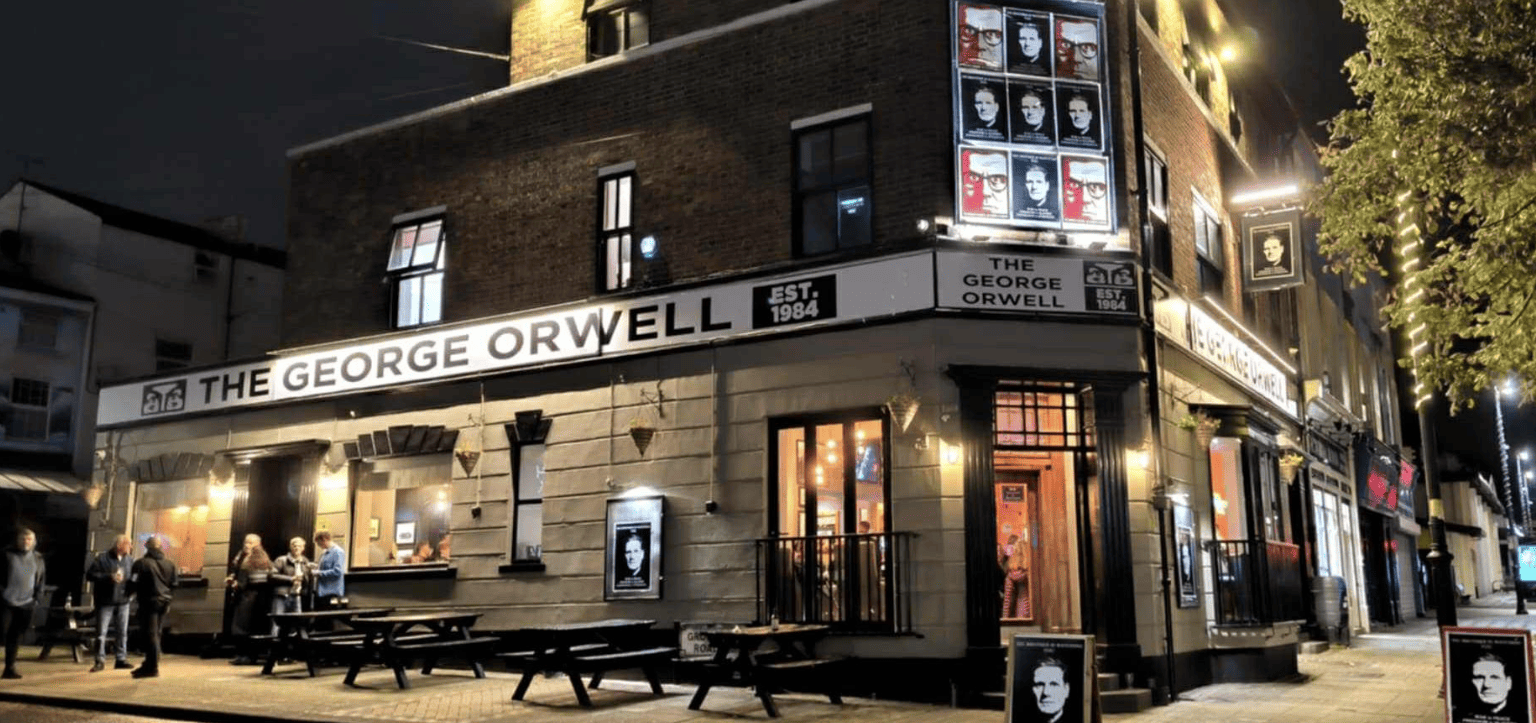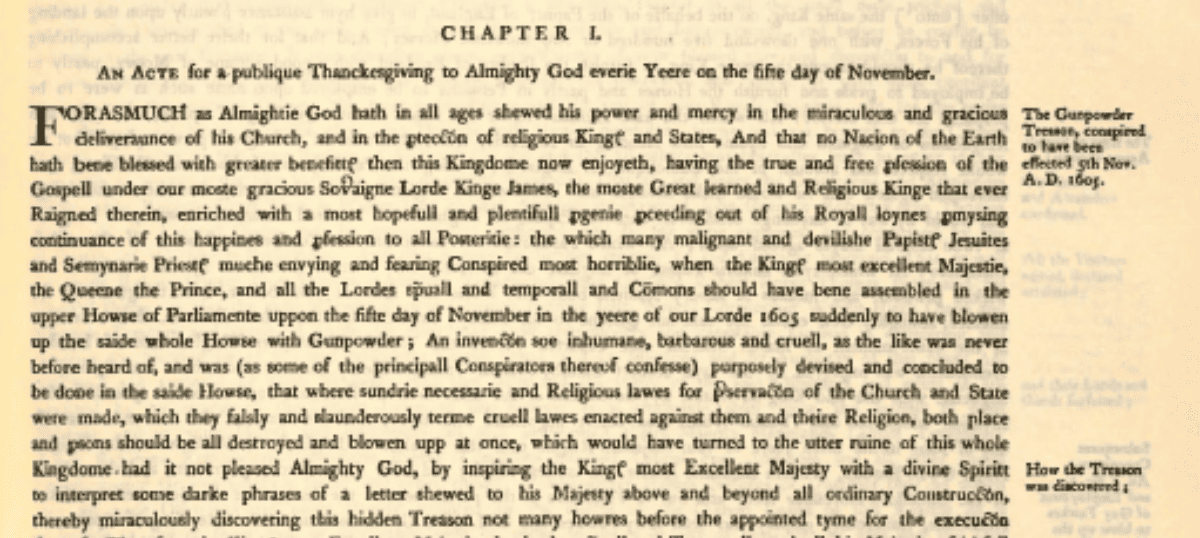Implementing the Great Repeal: Learning from an Illegal Lockdown
"Lockdown" was a seeming death-blow for English liberty. The ECHR/Human Rights Act allowed for the widest suspension in natural freedom in our history. It was justified through NHS-worship, and had no effective means of challenge. We must enforce English freedom using these same tactics.

The first two thirds of this article will be spent explaining the horrors of what we all lived through in Britain, the "Lockdown" of 2020-2023. The second half will provide a hopeful & steadfast programme for Britain's restoration, and, how we might learn from lockdown's sinister implementation to achieve it – so do hold on. This is not a re-hash of a beloved Lord Sumption rant about liberty, designed to soothe you to sleep. Fortunately for all of us, including the Lord Sumption, we are not in October 2020.
With that said; states rarely confess failure, they prefer to normalise it. Despite institutional collapse, governments carry on: forms processed, dashboards updated, ministers briefed, press offices churning. This is the tedious daily hum of Whitehall. But the deeper collapse is constitutional: the idea law constrains power has withered.
In Britain, such unravelling was laid bare in March 2020, when ministers invoked sweeping secondary legislation to confine healthy citizens to their homes in what amounted to varying degrees of house arrest, for what transpired to be two years. Note: British (and European, broadly) people must understand that the lockdowns of 2020-22 are considered unthinkable, baffling, "surely you're making this up" to anyone in the United States, for example.
The lockdown was not brought about by a parliamentary vote, it was not enacted via primary legislation from our supreme lawmaking body. Quite the contrary. It was brought in via "statutory instrument", a form of secondary legislation whereby parliament delegates its powers to ministers and departments. In this case, the Secretary of State for Health and Social Care (Formerly known as, "The Health Secretary").
Upon the passing of the Health Protection (Coronavirus, Restrictions) (England) Regulations 2020 (SI 2020/350), informally known as "the Lockdown Regulations", Parliament was contracted. Courts ratified decree after decree on the basis of the statutory instrument; and a new moral axiom took hold: “safety cancels liberty.” If anything encapsulates Britain’s decline, that moment does.
From seatbelts to national lockdowns, from regulatory speech controls to social conformity, 2020 showed how readily liberty can be excised and how compliant the public can be when a sacred institution (here, the NHS) is weaponised as moral cover. In the realm of speech, I don't think we ever truly recovered, as Preston Byrne recently showed, here.
Incidentally, amid the largest suspension of liberty in British history, something happened. In December 2021, the Conservative government launched a “Modern Bill of Rights” consultation (ending April 2022), to replace the Human Rights Act (1998). One might think that this review was timely, given that both the HRA/ECHR's positive duty to preserve life under Article 2, were providing the justification for the suspension of just about every other right the HRA/ECHR conferred in 2021. This irony was oddly not realised, nor did it meaningfully feature in the consultation. The consultation was also far from the first such consultation on the sins of positive rights ("human" rights) in Britain. In fact, it was the fourth.
The Human Rights Act, passed in 1998, has been formally reviewed or reconsidered for potential replacement on at least four occasions: under Tony Blair (2006), Gordon Brown (2007–09), David Cameron (via the 2012 Commission on a Bill of Rights), and Boris Johnson (in the 2021–22 consultation on a Modern Bill of Rights).
Johnson’s “Modern Bill of Rights” consultation was largely a charade—incidentally, I had already published a “fitness for purpose” critique of the Human Rights Act in the wake of COVID. This fell on deaf ears, as though any Blairite instrument must be clung to in times of crisis, even Blair's Institute for Global Change.
As beloved grandfather of the Restoration Dr. David Starkey canonised it:
We are in urgent need of restoration … the reversal of all that Blair has put in place.
What Really Happened and Why It Was Illicit
It's difficult to know where to start when it comes to the legal spaghetti of Britain's worst incident of soft totalitarianism.
The Wrong Statute for the Wrong Purpose
The Health Protection (Coronavirus, Restrictions) (England) Regulations 2020 were grafted onto the Public Health (Control of Disease) Act 1984. That act, from 1984 (fittingly) was designed for targeted interventions (quarantine, isolation, closure of premises linked to known disease vectors)—not for large‑scale house arrest of healthy individuals.
This route of implementation is telling – it would never have passed a functional parliament in March 2020, at least not before the state of emergency was foist upon us by secondary legislation. The government’s failure to deploy the Civil Contingencies Act 2004 is telling too: the CCA comes with explicit safeguards (sunset clauses, parliamentary renewal, stricter thresholds). Using the 1984 Act was a legal sleight, letting ministers avoid scrutiny and circumvent constitutional constraints. They acted procedurally ultra vires, dismantling the logic of delegated powers, and the specific purpose of the 1984 act under which they were enacted.
The Human Rights Act as a Coercive Lever
Ministers held up Article 2 ECHR (right to life) as categorical, claiming it trumped rights under Articles 5, 8, 9, 10, 11—even though no Article 15 derogation was ever invoked during any phase of the lockdowns. In effect, they pursued emergency powers by stealth.
The proportionality test of the HRA (intended to check arbitrary power) was inverted into a laundering mechanism. The State asserted a “serious and imminent threat” on its face, largely on the basis of Imperial College's worst-case-scenario modelling, then claimed every restriction was proportionate to that worst case scenario. Of course, this was proportionate based on a worst case scenario which never came to pass.
Parliament Displaced by the Instrument Storm
The March 2020 Regulations passed with minimal debate. Then the law was repeatedly redrawn by dozens of statutory instruments while Parliament sat at reduced capacity. Though the Joint Committee on Human Rights expressed “concerns,” it lacked any binding check on the executive. Ministers, meanwhile, flooded the field with regulation storms (incremental tweaks, emergency orders, reinterpretations), faster than courts, claimants, or Parliament could react.
The legislature became a spectator while the executive consolidated control. In practice, SAGE (a technocratic advisory body) functioned as a parallel governance mechanism, usurping the regulation of English liberties.
Vagueness as a Weapon
The linchpin of coercion was the elastic phrase “reasonable excuse” (Regulation 6). In Dolan, the Court of Appeal attempted to finesse an Article 5 conflict through an interpretive route under section 3 HRA - which violates the principle of legality (as in Simms): fundamental rights cannot be overridden by vague language.
The executive weaponised ambiguity: where rules are elastic, enforcement is arbitrary. The predictable result was chilling effects, arbitrary policing, and error‑ridden judgments (e.g. Dinou). Citizens forced into silence or risk.
Justice Priced Out
The cost of judicial review in Dolan (£684,535 for a private claimant) was ruinous. Meanwhile, ministers repeatedly altered the regulatory structure mid‑litigation, forcing challengers to chase moving targets. A constitutional system which demands six‑figure litigation merely to test the legality of regulation is no rule‑of‑law regime. It is rule by deterrence.
In short: ministers seized coercive powers they did not lawfully possess. The HRA’s proportionality test was subverted. Parliament was sidelined. Citizens were priced out of redress. That is the substance of what transpired.
Safety as Standing Warrant
Lockdown shattered our procedural jurisprudence. Even Lord Sumption, often touted as a libertarian bulwark, mangled consistency: his very own reasoning in Nicklinson, where he privileged life over autonomy, undermined his resistance to lockdown. I agree with his latter reasoning, which was discovered amid the almost three-year long period of quasi house arrest. Then again, it would not be the first time where Lord Sumption and I have disagreed – the Public Order Act's continued existence is one such disagreement.
Nonetheless, Sumption’s aphorisms hold weight: “The NHS is there to protect us, not the other way round,” and “You cannot imprison the entire population.” Bureaucratic unpreparedness does not justify rule by decree. Not having a plan meant house arrest for the entire nation. We may see the same play out if a Reform government is elected, its whole cabinet (whomever they may be) having never read The Restorationist.
What is clear from lockdown, and its implementation on a grand and national scale, is that law no longer binds morality. Bureaucracy, and risk avoidance, claims the moral high ground at all times in a Blairite-run Britain. Authorities now invoke “life” or “liberty” flexibly, whichever serves their momentary ends. The true value of life, or liberty, is lost on them.
Everything Functions, Nothing Works
This is not hyperbole. It is a ledger of institutional hollowing.
- Productivity in Q2 2025 is only 1.5 % above 2019 levels—and down 0.8 % year over year. The Commons Library labels growth anaemic.
- NHS England reports 7.4 million pathways open as of July 2025; 61.3 % wait up to 18 weeks; nearly 200,000 wait over a year. The BMA confirms waiting times remain far worse than pre‑COVID.
- The Crown Court backlog is ~78,329 cases (June 2025), with trial delays stretching to four years. MOJ data show systemic dysfunction.
Lockdown taught officials there will be no consequences, as long as we are safe. The NHS was sacralised; non‑COVID care postponed indefinitely. Agencies like DVLA and HMRC receded; courts migrated online, rendering justice invisible. “Protect the NHS” mutated into constitutional doctrine. Performance decayed; nobody picked up a phone for years, a generation of zoomers were turned into zoomerwaffen through sheer state-mandated social isolation.
Designed for Dysfunction
In Nothing Works, I argued our state now rewards compliance and punishes ambition, compresses wages, and drains incentive. In a regime built to fail, failure is not a bug; it is a feature. That is the Britain that has crawled out from under 2 decades of Blairite constitutional reform, and then, a brutal lockdown – a country that cannot even permit its own population to describe how they are no longer free or wealthy – hell – they're no longer even English following the stealth introduction of millions of LEDC, Global Southerners into our midst (The Boriswave).
Those seduced by talk of “resilience” should note the bond market’s warning. The U.S. yield curve has long forecast recessions, as Chris Woodhouse wrote in The Restorationist only last month; the U.K.’s bond market warning noisier thanks to Bank of England intervention, but the signal remains. A sustained inversion signals weak growth and collapsing confidence.
So, what is to be learned from this hammering defeat?
Learning from Lockdown
One should reject lockdown on constitutional, moral, and institutional grounds: it weaponised rights to suspend liberties en masse. But one should not deny the architects’ competence. They followed a template. We must master that template, and build upon it, as I touched upon in June's article "How To Lawfully Destroy a Hostile constitution". The lessons of lockdown should not be that we may so easily suppress freedom, but that we may use these strategies to restore it – nay – to enforce it on the unwilling British populace.
The Lockdown Template
- Deploy a pliable parent Act (1984 Act) rather than a robust emergency statute (CCA).
- Pre‑answer judicial review by declaring “serious and imminent threat” on the face of the instrument.
- Legislate via SI storms: move faster than litigation.
- Mask coercion in vagueness (e.g. “reasonable excuse”).
- Use s.3 HRA to fragment challenges, slow and personalise litigation.
- Cloak everything in moral optics: invoke Article 2 (life) as warrant, stigmatise dissent as risk-prone and dangerous.
- Force critics to expend treasure and time challenging your secondary legislation in the courts; let the executive govern iteratively.
The Dolan proceedings show how effective this architecture is at deterring opposition—exhausting and bankrupting challengers.
We must invert every element of that which has been used against us, for example. When implementing pro-liberty measures, such as The Restorationist's Free Speech Act, one must:
- Bundle bills to bypass incremental chokeholds.
- Pre-empt known JR arguments in explanatory preambles to legislation, primary and secondary, as it is implemented.
- Use commencement and schedules so partial invalidity does not derail the whole.
- Proceed sector by sector with lean, tightly drafted SIs.
- Force opponents into fact‑intensive trenches while the constitutional core advances, and is passed into law.
- Execute first, litigate later—let review trail behind.
Seven Bills to Let Britons Breathe
As co‑author of the Great Repeal, I propose an initial tranche of bills to bring relief to the British people – relief that many have never experienced in their entire lives. Not slogans, but instruments. The Blairite constitutional project, and its chosen method of governance through the permanent-state (QUANGOs) allowed lockdown to happen. That constitutional project can be reversed, as discussed in my essay England is Under Attack, written late in 2024. The mantra of international human rights justified its continuation.
The bills we propose to implement, in the most forceful manner possible are as follows:
- ROBO (Repeal of Bureaucratic Overreach) Act
Ends executive governance by guidance. Narrows Henry VIII clauses. Converts “codes” and “frameworks” into justiciable rules or nothing. Imposes performance duties and enforceable timeliness standards on agencies (NHS, DVLA, HMRC). It is capably explained here. - Negative Liberty Act
Reestablishes the common law presumption: what is not forbidden is permitted. Requires express statutory language to limit core liberties (movement, worship, assembly, speech). Recasts HRA interpretation so s.3 is narrow and s. 19 statements are carefully constrained; reserves the declaration of incompatibility power to the Supreme Court. It is explained here and the full text of the bill is downloadable. - Free Speech Act
Restores the default rule: speech is lawful unless expressly forbidden. Abolishes “non‑crime hate incidents,” disallows policing of lawful expression, imposes a public duty on bodies to refrain from penalising lawful speech. Restricts speech limitations to narrow enumerated harms, with warrants if coercion applies. Published here, where the full text of the bill is downloadable. - British Immigration and Citizenship Act (BINCA)
Reorients citizenship toward loyalty and belonging. Limits the franchise to citizens. Establishes presumption of assimilation and mandates government duty to foster civic ecology enabling assimilation. Published here, where the full text of the bill is downloadable. - Barbaric Practices Act
Criminalises practices inconsistent with a minimal moral baseline (e.g. child marriage, forced confessional arbitration, coerced cultural penalties). Criminalizes enforcement of foreign penal codes. Imposes positive duties on agencies to act when power is withheld. Viewable here, with full bill. - Oblivion Act
A one‑time sunset for the COVID emergency architecture. Repeals residuals in the Coronavirus Act; amends the 1984 Act to forbid population‑wide confinement by SI; turns emergency powers into hard sunset + supermajority renewal tools. Requires transparent derogation to suspend Convention rights. Viewable here, with full bill. - Unity Act
Abolishes the Lords, HRA, and local authorities. Revolutionises the entire constitutional arrangement of the United Kingdom to face the next imperial century of maritime and space travel. At time of writing (17th October), not yet published.
Method of Passage (Redeployed)
- Use preambles that pre‑answer proportionality by rooting “serious and imminent threat” to sovereignty, legality, capacity.
- Guillotine timetables and bundled schedules to deny death by amendment.
- Rolling commencements by sector: if one clause fails, the rest proceed.
- Smart use of s.19 HRA statements; force opponents to plead facts, not facial incompatibility.
- Maintain a pace faster than litigation: review is the exception, not the brake.
To those who cry, “Is this just authoritarianism in blue?” the answer is simple: they used emergency technique to suspend liberty.
We will use lawful, parliamentary technique, at speed, to restore it. Or, in Starkey’s words, effect a “restoration—deliberate reversal.”
Let the Englishman Breathe
“Dolan challenged lockdown—won’t opponents challenge you?” The difference is constitutional posture and purpose. Dolan was correct because the state’s action was ultra [very-bloody] vires, and in turn, directly harmful to the healthy British public.
Our project is restorative: to reinstate Parliament’s command, reimpose rights as constraints, and make emergency exceptional again.
Yes, litigation will come. But we will outpace it.
Well‑drafted legislation will force opponents into narrow, fact‑specific trenches where cost and fragmentation rise—and precedents fracture. Precisely the sort of terrain ministers carved in 2020.
The difference is the end: we will re‑stitch what they unravelled. Because we are better prepared and more heavily armed with the technology they lack.
Lockdown did not merely interrupt the constitutional order: it recoded it. Since 2020, nothing works and no one is accountable.
Productivity is anaemic; 7.4 million await care; justice is delayed years. The yield curve warns: stagnation deepens if we remain passive. Our borders have ceased to function, and the "Boriswave" now ransoms our public finances via Indefinite Leave to Remain, as Charlie Cole discussed here in June.
As Sumption once insisted, institutions must serve, not rule, or provide the justification for the individual's subjugation.
Our proposals for restoration are not metaphysical, they are legislative and will ensure that this never happens again: Pass them with the discipline our opponents taught. End emergency as a governing habit. Reassert Parliament. Restrict proportionality to what is proportional. Put law back before power. This is the only way to take Britain out of its permo-crisis form of governance – a form of governance that will only get worse with time, if we do not take the political off-ramp.
Then Britain can work again. Because this time, it will be meant to.




